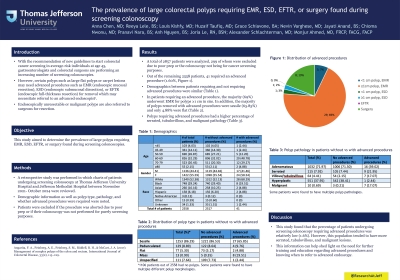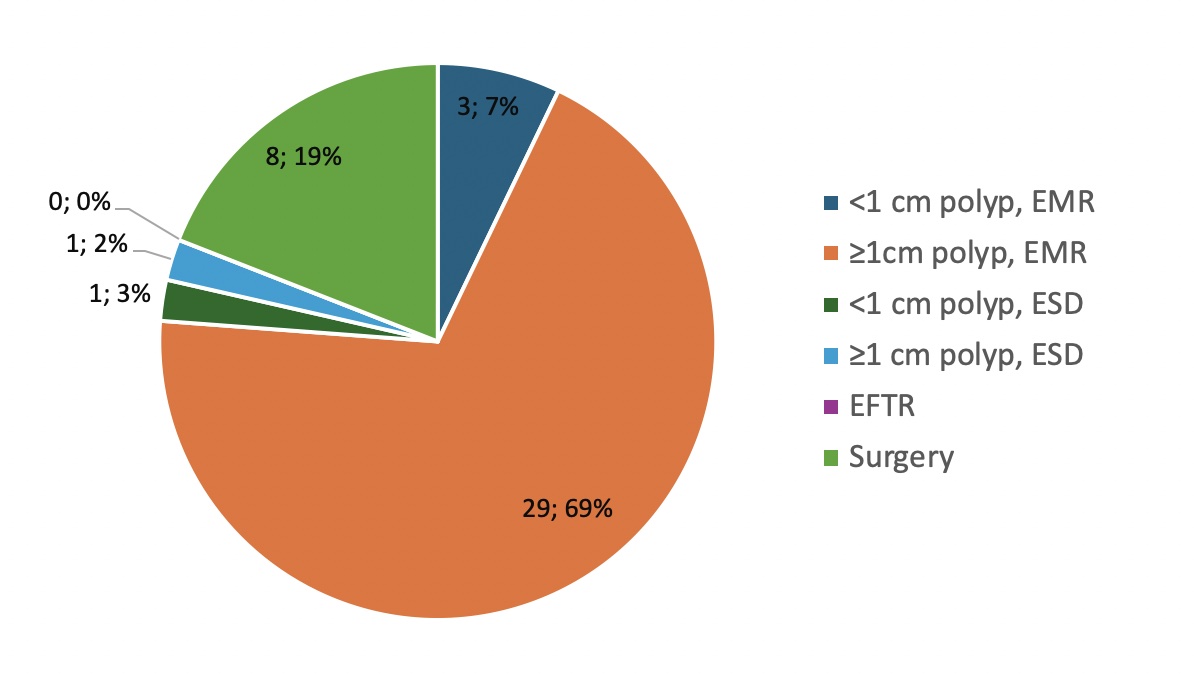Tuesday Poster Session
Category: Interventional Endoscopy
P4487 - The Prevalence of Large Colorectal Polyps Requiring EMR, ESD, EFTR, or Surgery Found During Screening Colonoscopy
Tuesday, October 29, 2024
10:30 AM - 4:00 PM ET
Location: Exhibit Hall E

Has Audio

Anna Chen, MD
Thomas Jefferson University Hospital
Philadelphia, PA
Presenting Author(s)
Anna Chen, MD1, Reeya Lele, BS2, Louis Kishfy, MD1, Huzaif Taufiq, MD3, Grace Schiavone, BA2, Nevin Varghese, MD1, Jayati Anand, BS2, Chioma Nwonu, MD1, Pranavi Nara, BS2, Anh Nguyen, BS2, Joria Le, RN, BSN2, Alexander Schlachterman, MD2, Monjur Ahmed, MD, FACG1
1Thomas Jefferson University Hospital, Philadelphia, PA; 2Sidney Kimmel Medical College at Thomas Jefferson University, Philadelphia, PA; 3Thomas Jefferson Health, Philadelphia, PA
Introduction: With the recommendation of new guidelines to start colorectal cancer screening in average-risk individuals at age 45, gastroenterologists and colorectal surgeons are performing an increasing number of screening colonoscopies. However, certain polyps such as large flat polyps or carpet lesions may need advanced procedures such as EMR (endoscopic mucosal resection), ESD (endoscopic submucosal dissection), or EFTR (endoscopic full-thickness resection) for removal which may necessitate referral to an advanced endoscopist1. Endoscopically unresectable or malignant polyps are also referred to surgeons for resection. This study aimed to determine the prevalence of large polyps requiring EMR, ESD, EFTR, or surgery found during screening colonoscopies.
Methods: A retrospective study was performed in which charts of patients undergoing screening colonoscopy at Thomas Jefferson University Hospital and Jefferson Methodist Hospital between November 2021-October 2024 were reviewed. Demographic information as well as polyp type, pathology, and whether advanced procedures were required were noted. Patients were excluded if the procedure was aborted due to poor prep or if their colonoscopy was not performed for purely screening purposes.
Results: A total of 2857 patients were analyzed, 299 of whom were excluded due to poor prep or the colonoscopy not being for cancer screening purposes. Out of the remaining 2558 patients, 41 required an advanced procedure (1.60%). Demographics between patients requiring and not requiring advanced procedures were similar. In patients requiring an advanced procedure, the majority (69%) underwent EMR for polyps ≥1 cm in size. In addition, the majority of polyps removed with advanced procedures were sessile (65.85%) and only 4.88% were flat. Polyps requiring advanced procedures had a higher percentage of serrated, tubulovillous, and malignant pathology.
Discussion: This study found that the percentage of patients undergoing screening colonoscopy requiring advanced procedures was relatively low. However, this population tended to have more serrated, tubulovillous, and malignant lesions. This information can help shed light on the need for further training and education regarding advanced procedures and knowing when to refer to advanced endoscopy.
References:

Note: The table for this abstract can be viewed in the ePoster Gallery section of the ACG 2024 ePoster Site or in The American Journal of Gastroenterology's abstract supplement issue, both of which will be available starting October 27, 2024.
Disclosures:
Anna Chen, MD1, Reeya Lele, BS2, Louis Kishfy, MD1, Huzaif Taufiq, MD3, Grace Schiavone, BA2, Nevin Varghese, MD1, Jayati Anand, BS2, Chioma Nwonu, MD1, Pranavi Nara, BS2, Anh Nguyen, BS2, Joria Le, RN, BSN2, Alexander Schlachterman, MD2, Monjur Ahmed, MD, FACG1. P4487 - The Prevalence of Large Colorectal Polyps Requiring EMR, ESD, EFTR, or Surgery Found During Screening Colonoscopy, ACG 2024 Annual Scientific Meeting Abstracts. Philadelphia, PA: American College of Gastroenterology.
1Thomas Jefferson University Hospital, Philadelphia, PA; 2Sidney Kimmel Medical College at Thomas Jefferson University, Philadelphia, PA; 3Thomas Jefferson Health, Philadelphia, PA
Introduction: With the recommendation of new guidelines to start colorectal cancer screening in average-risk individuals at age 45, gastroenterologists and colorectal surgeons are performing an increasing number of screening colonoscopies. However, certain polyps such as large flat polyps or carpet lesions may need advanced procedures such as EMR (endoscopic mucosal resection), ESD (endoscopic submucosal dissection), or EFTR (endoscopic full-thickness resection) for removal which may necessitate referral to an advanced endoscopist1. Endoscopically unresectable or malignant polyps are also referred to surgeons for resection. This study aimed to determine the prevalence of large polyps requiring EMR, ESD, EFTR, or surgery found during screening colonoscopies.
Methods: A retrospective study was performed in which charts of patients undergoing screening colonoscopy at Thomas Jefferson University Hospital and Jefferson Methodist Hospital between November 2021-October 2024 were reviewed. Demographic information as well as polyp type, pathology, and whether advanced procedures were required were noted. Patients were excluded if the procedure was aborted due to poor prep or if their colonoscopy was not performed for purely screening purposes.
Results: A total of 2857 patients were analyzed, 299 of whom were excluded due to poor prep or the colonoscopy not being for cancer screening purposes. Out of the remaining 2558 patients, 41 required an advanced procedure (1.60%). Demographics between patients requiring and not requiring advanced procedures were similar. In patients requiring an advanced procedure, the majority (69%) underwent EMR for polyps ≥1 cm in size. In addition, the majority of polyps removed with advanced procedures were sessile (65.85%) and only 4.88% were flat. Polyps requiring advanced procedures had a higher percentage of serrated, tubulovillous, and malignant pathology.
Discussion: This study found that the percentage of patients undergoing screening colonoscopy requiring advanced procedures was relatively low. However, this population tended to have more serrated, tubulovillous, and malignant lesions. This information can help shed light on the need for further training and education regarding advanced procedures and knowing when to refer to advanced endoscopy.
References:
- Angarita, F. A., Feinberg, A. E., Feinberg, S. M., Riddell, R. H., & McCart, J. A. (2017). Management of complex polyps of the colon and rectum. International Journal of Colorectal Disease, 33(2), 115–129.

Figure: Figure 1: Distribution of advanced procedures
Note: The table for this abstract can be viewed in the ePoster Gallery section of the ACG 2024 ePoster Site or in The American Journal of Gastroenterology's abstract supplement issue, both of which will be available starting October 27, 2024.
Disclosures:
Anna Chen indicated no relevant financial relationships.
Reeya Lele indicated no relevant financial relationships.
Louis Kishfy indicated no relevant financial relationships.
Huzaif Taufiq indicated no relevant financial relationships.
Grace Schiavone indicated no relevant financial relationships.
Nevin Varghese indicated no relevant financial relationships.
Jayati Anand indicated no relevant financial relationships.
Chioma Nwonu indicated no relevant financial relationships.
Pranavi Nara indicated no relevant financial relationships.
Anh Nguyen indicated no relevant financial relationships.
Joria Le indicated no relevant financial relationships.
Alexander Schlachterman: Boston Scientific – Consultant. Fuji – Consultant. Laborie – Consultant. Lumendi – Consultant. Olympus – Consultant.
Monjur Ahmed indicated no relevant financial relationships.
Anna Chen, MD1, Reeya Lele, BS2, Louis Kishfy, MD1, Huzaif Taufiq, MD3, Grace Schiavone, BA2, Nevin Varghese, MD1, Jayati Anand, BS2, Chioma Nwonu, MD1, Pranavi Nara, BS2, Anh Nguyen, BS2, Joria Le, RN, BSN2, Alexander Schlachterman, MD2, Monjur Ahmed, MD, FACG1. P4487 - The Prevalence of Large Colorectal Polyps Requiring EMR, ESD, EFTR, or Surgery Found During Screening Colonoscopy, ACG 2024 Annual Scientific Meeting Abstracts. Philadelphia, PA: American College of Gastroenterology.

